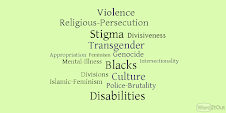Over 100 years later, Dickens wrote Oliver Twist, which begins with a satire of England's Poor Laws and the pseudo-science used to address problems of English poverty. (Swift was perhaps smiling in his grave.) The novel's nightmarish "workhouse," where the orphaned, penniless Oliver spends his childhood, was designed not by sadists but by social reformers (though reading the novel, it is hard to tell the difference between sadists and social reformers as the scientists and politicians have figured out just how much gruel the starving children can get at each meal and Oliver, still starving, is severely punished for boldly asking for "more").
How do we measure social problems and what do our measurement tools say about us as a civilization?
This question was brought home to us today in class as Professor Stein, Lisa, Manny and Danielle recounted a recent panel discussion at the College and talked about the trend toward "evidence-based practice," a practice which emphasizes measuring the effectiveness of current programs in order to support good ones and eliminate bad ones. This seems as unobjectionable as wanting to measure issues like poverty and hunger in order to relieve them. But as we discussed in class, measuring is a complicated business: what do we measure? when do we start/stop measuring it? what gets left out of the process?
A story making the news today involves a high school in Rhode Island (link in "Check It Out" section on the blog). The school was failing and the superintendent was given 4 "models" to choose from in her task of turning the school around. One of the models involved firing all faculty and staff. Evidence to support this dramatic decision came in the form of studies which measured things like student proficiency at math (only 7% by 11th grade), retention rates (almost half the students dropped out), and academic performance (many students were failing at least two classes). Even as a teacher, I gotta admit this is some pretty gnarly data. But what these studies don't measure is that over half the students are living under the poverty line, and that many are non-native English speakers. One student, living with a single mom who works long hours in a factory, says that her teachers were the only constants in her life. How do you measure that?
These are questions for our own school as well as all departments are gearing up for review in a few years and need to perform and document elaborate "outcomes assessments." That is jargon for figuring out how well we do what it is we think we're doing. Just like "evidence-based practice," that seems pretty common sense, pretty unobjectionable. And I can imagine some measurement tools for what I do: essay exams, a certain kind of paper assignment, good attendance and solid student grades. But when I really think about why I do what I do -- to make students happy and engaged for a couple hours a week, to turn a student into the kind of person who can't put a book down, who is capable of greater empathy because he/she has learned through literature to understand how other people feel, who understands the power and satisfaction that come with being able to express oneself clearly and intelligently, and who maybe doesn't fully understand the impact of a class until, 15 years later, when he/she is reading to his/her own child -- how do I measure this? In answer, my own modest proposal that we measure how well a student retains a piece of literature by weighing the student, turning the book into a "fricassee," feeding it to the student and then weighing the student afterwards. (I profess, in the sincerity of my heart, that I have not the least personal interest in endeavoring to promote this necessary work, as I have already eaten all of my own books.)

